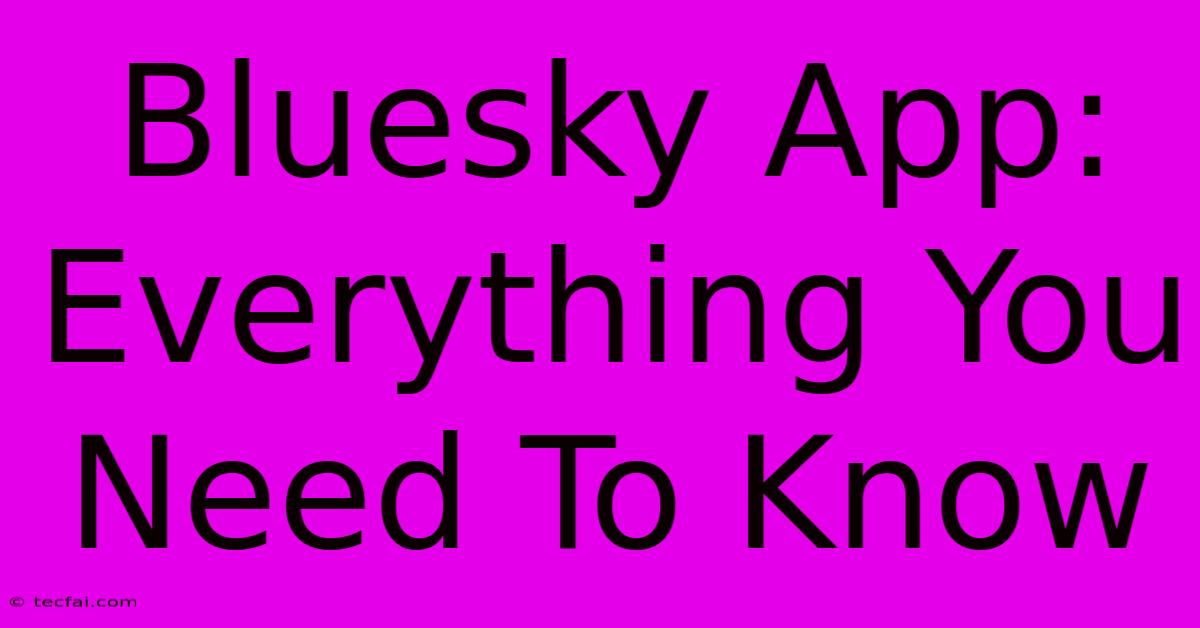Bluesky App: Everything You Need To Know

Discover more detailed and exciting information on our website. Click the link below to start your adventure: Visit Best Website tecfai.com. Don't miss out!
Table of Contents
Bluesky App: Everything You Need To Know
The digital landscape is constantly evolving, with new platforms and technologies emerging at a rapid pace. One such platform gaining traction is Bluesky, a decentralized social media network aiming to challenge the dominance of existing giants like Twitter. This article will dive into the world of Bluesky, exploring its features, benefits, and potential implications for the future of social media.
What is Bluesky?
Bluesky is a decentralized social media network being developed by a team at Twitter, although it operates as an independent entity. The core principle behind Bluesky is to create an open and interoperable social network, free from the control of any single company. This decentralized approach aims to empower users by giving them more control over their data, content, and interactions.
How Does Bluesky Work?
Unlike centralized social media platforms like Twitter or Facebook, Bluesky is built on a federated protocol, meaning it consists of multiple independent servers (nodes) that communicate with each other. This architecture allows users to choose which server they want to be part of, providing a greater degree of flexibility and control over their online experience.
Key Features of Bluesky
While still under development, Bluesky offers a range of features that highlight its commitment to decentralization and user empowerment:
- Open Source: The entire Bluesky platform is open-source, allowing developers to contribute to its development and improve its functionality.
- Data Portability: Users have the freedom to export their data, ensuring ownership and control over their information.
- Algorithmic Transparency: Bluesky aims to make its algorithms more transparent, enabling users to understand how their feeds are curated and personalized.
- Content Moderation Flexibility: Different servers can implement their own content moderation policies, allowing users to find communities that align with their values.
Benefits of Using Bluesky
- Increased Privacy: Decentralization reduces the potential for data breaches and allows users to maintain more control over their information.
- Reduced Censorship: With multiple independent servers, users have a wider range of options for finding communities and expressing themselves without fear of censorship.
- Enhanced Freedom of Expression: The open-source nature of Bluesky encourages a more diverse and inclusive environment for sharing ideas and perspectives.
- Future-Proof Platform: Decentralization helps create a more resilient and adaptable platform, less vulnerable to technological disruptions.
Concerns and Challenges
While Bluesky holds immense potential, it also faces several challenges:
- Scalability: Building a decentralized platform capable of handling a large number of users is a complex technical undertaking.
- User Adoption: Attracting a significant user base is crucial for the success of any social network.
- Content Moderation: Finding the right balance between freedom of speech and responsible content moderation is a constant challenge.
- Competition: Bluesky will need to compete with established social media platforms for user engagement and market share.
Conclusion
Bluesky represents a promising step towards a more decentralized and user-centric internet. Its focus on privacy, freedom of expression, and algorithmic transparency offers a compelling alternative to existing social media platforms. While it's still early days for Bluesky, its potential to reshape the future of social media is undeniable. As the platform matures and expands, it will be interesting to observe its impact on the digital landscape and the role it plays in fostering a more equitable and open internet.

Thank you for visiting our website wich cover about Bluesky App: Everything You Need To Know. We hope the information provided has been useful to you. Feel free to contact us if you have any questions or need further assistance. See you next time and dont miss to bookmark.
Featured Posts
-
Paraguay Vs Argentinie Opstellings
Nov 15, 2024
-
Sydney Sweeneys Support For Women In Hollywood
Nov 15, 2024
-
New Afl Jersey Fans React With Fury
Nov 15, 2024
-
What Time Is Cobra Kai Season 6 Part 2 Out On Netflix
Nov 15, 2024
-
Who Is Robert F Kennedy Jr
Nov 15, 2024
